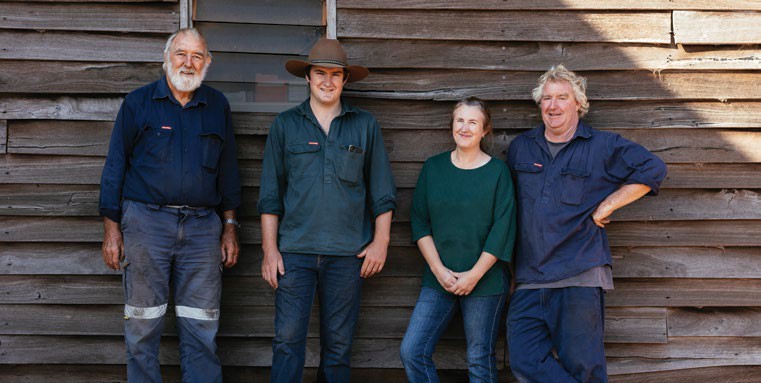succession casestudy FEATURE
Conversation
STARTERS
Mark and Catherine Scott of Nannup Fresh Fruit tell us how they got it right – for them.
As told to Anna Flanders Photography Victoria Baker courtesy Pomewest

FROM LEFTThe Scotts: Mark’s father Chris, James, Catherine and Mark.
vWA When did you first start working on succession?
Mark We worked through the main part of succession planning 12 years ago when my parents were in the business. My wife Catherine and I now run the business. My father still works on the farm eight to 10 hours a day. He loves it. My mom worked up until two years ago.
vWA When did you start working on the farm?
Mark I was brought into the business when I was 19 or 20. Conversations came up about succession a long time before we started working on it. When Mum and Dad got to their late fifties, and it was obvious my brother and sister had solid careers in mining, we had conversations around what succession was going to look like. We came up with some business structure changes at that time, moving the business from being run as a partnership to a private company in charge of a trust. It’s 100% important to get in that early. It allows the business itself to do some planning in terms of structure and it’s important to work out the most cost-effective way to plan the transition, looking at government assistance and pensions for those retiring, etc.
vWA How did you start?
Mark We used our accountant and found the right lawyer. A piece of advice is: do lots of homework around what you want. The Grain Research and Development Corporation does a great handbook, which is specifically on succession, and has 25 or 30 different scenarios. We found that accountants and lawyers are great, but they want some guidance about what you want. It’s important to balance expectations of not just the people staying on the farm, but those who aren’t. Not having a good plan can cause a lot of harm. We have approached everything from a very business-minded point of view. All agreements have been processed officially through lawyers and have been properly contracted and, if needed, lodged with government departments.
vWA Pros and cons?
Mark One of the challenges I’ve seen in other businesses is the topic of death. But dealing early on with the concept of growing old and dying helps with that. It’s also important for the people stepping down: you need to look after their expectations and what they want for their future. Conflict will occur. But it’s about finding a suitable way through conflict, rather than avoiding it. When you’ve moved through succession planning and come out the other end, everybody knows where they stand. And I think that’s really important. Those retiring have certainty over an income and what their future looks like; the people who are taking on the business have certainty and they can make decisions as the business owners. It gives a level of comfort.
Catherine Our plan has been successful in how it’s set up and managed, so we haven’t needed to revisit it.
vWA And the next succession – when does that happen?
Catherine Our son James, 20, is quite lucky in that he is the only one with a passion for the farm. We have two other children: one’s at university studying engineering and one’s finishing high school and will likely do something similar. We’ve been very lucky. However, if all our children want to be part of the business, we can make that work, too. We’re a few years off starting the next round of succession planning from a formal point of view. James has to make some big decisions.
vWA Any last words of wisdom for those starting out?
Catherine I think all good succession starts with communication. People start saying: “What are we doing in five years? What are we doing in 10 years?” And the sooner you do that, I think the better your long-term outcome is going to be.